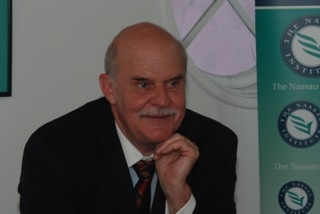 First published at Forbes.com and posted here with the kind permission of the author.
First published at Forbes.com and posted here with the kind permission of the author.
During my earlier years as an immigrant I used to have nightmares that I was back in Argentina, my native country. I had seen lives, businesses, and countless dreams destroyed from one day to the next by the arbitrary use of law, or by the lack of enforcement of good laws. Many had a blind-eye to one aspect or another of true justice. Left-wing human rights activists were blind to the attacks and abuses on businessmen, right-wing sympathizers were blind to the killings and abductions of terrorists. Instead of a blind justice, we grew up in a country with an epidemic of blindness towards the treasure of the true rule of law.
Civil society got uncivil by witnessing government agencies acting as prosecutors, regulators and judges of their own causes. Bureaucrats could send to bankruptcy almost any company that got entangled in their web of confusing, unknown, and often conflicting regulations. The arbitrariness and impunity of rulers, elected and unelected, caused most of us to lose respect even for needed rules and regulations.
Is the United States being infected by the same malaise? In the “American Illness, Essays on the Rule of Law, ” (Yale University Press, 2013) the authors tackle several of the most pressing challenges to freedom and prosperity. Judged by the contents of the book the answer is worrisome: most aspects of rule of law in America are under attack.
The collection edited by Frank H. Buckley includes chapters by scholars from top law schools. Being at George Mason University, a university with an unparalleled number of market-oriented economists, Buckley has witnessed and led fruitful dialogues between them and lawyers. It’s not surprising then that several of the authors have ample expertise in the world of think tanks, including the RAND Corporation, Hoover, Mercatus, the Center for Contract and Economic Organization at Columbia University, the Berkeley Program in Law and Economics, and the Freeman Spogli Institute at Stanford.
Economists, legal scholars, and political philosophers define rule of law in different ways and focus on different aspects. They all, however, point to the essential role it plays in a free society and the importance of impartiality by the courts. Francis Fukuyama devotes part of his chapter “The Rule of Law in China” to define the term. While economists stress “modern property rights and contract enforcement” lawyers see the law as “a body of rules of justice that bind a community together.”
Fukuyama points out the three main problems faced by the Chinese model: centralized bureaucracies have trouble adapting to the fast changes of today’s economy; it relies on “good emperors” and there is never a guarantee that they will always be “good”; and it lacks legitimacy. After reading “American Illness” one gets the impression that the U.S. is moving in the same direction: Centralized bureaucracies are given more power; the hypocrisy of our “emperors” is eroding confidence in the entire rule of law; and the system is losing legitimacy as it is seen as serving crony capitalists and crony progressives.
In his chapter, Richard Epstein shows the damage caused by “progressive” thinking and the growth of government intervention. He calls for a return to the classical liberal provisions that spur innovation and focus on rules that lead to long term growth. The Consumer Financial Protection Bureau goes in exactly the wrong direction. It gives its recently confirmed director, Richard Cordray, unprecedented and almost unsupervised powers. It is the newest example of agencies that by their nature and incentives are destined to trample on the rule of law.
In an unpublished paper delivered to the Federalist Society last month, Dr. Allan Meltzer of Carnegie Mellon University, and also a fellow at Hoover, described how the new regulations are taking us further away from the rule of law we claim to uphold. He argues that the United States is on the same path that “led in many countries to corruption, crony capitalism, and special privilege.”
Given the importance that the rule of law has for the health of the free enterprise system, this is a book of particular importance for economists and investors. Like in the movie “Fantastic Voyage” (1966), where a miniaturized submarine takes a crew through the blood system of human body to find a clot, the well selected chapters of “American Illness” take the reader through the different parts of the American legal body. The view from the inside is not nice. In the words of Judge Douglas H. Ginsburg, the essays show how “the American legal system burdens our citizens and our economy and puts us at an international competitive disadvantage.” Let’s hope that increased awareness of the illness will lead think tanks and scholars to redouble the efforts to recover the rule of law. The American dream is at stake.
Dr. Chafuen is president of Atlas Economic Research Foundation. He is a member of the board of advisors to The Center for Vision & Values and a trustee of Grove City College, and the president and founder of the Hispanic American Center of Economic Research. He serves on several boards including the Chase Foundation of Virginia, the Acton Institute, the Fraser Institute (Canada), and is an Active Honorary Member of the John Templeton Foundation.

